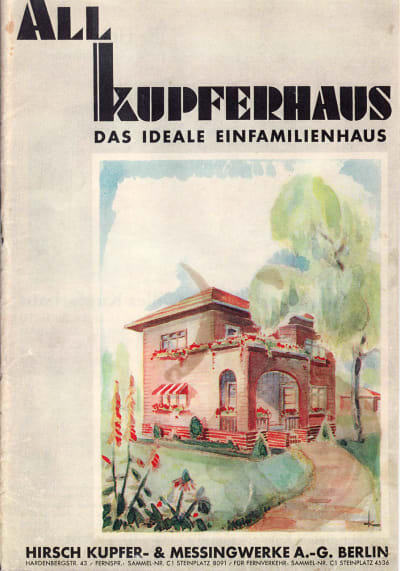Brazilian Portuguese rights (Editura Nau)
But then came the global economic crisis, Hitler assumed power, and suddenly the prefabricated dwellings were known as ›Jerusalem‹ and...
Berlin, in the late 1920s. The Hirsch Kupfer und Messingwerke designed a prefabricated house – made of the weather-resistant copper from their own factory. Walter Gropius was commissioned to refine the designs, the houses were called things like ›Copper Castle‹ and ›Spring Dream‹.
But then came the global economic crisis, Hitler assumed power, and suddenly the prefabricated dwellings were known as ›Jerusalem‹ and ›Lebanon‹. The company placed an ad in the Jüdische Rundschau that read: »Take a copper house with you to Palestine. Despite the intense heat your rooms will remain cool.« Friedrich von Borries and Jens-Uwe Fischer tracked down the builder and residents of the copper houses in Germany and Israel and talked with them about what home means to them.
Persons
Friedrich von Borries
Jens-Uwe Fischer
OTHER PUBLICATIONS

Architecture in the Anthropocene
English world rights (Seagull)

Caught in the Titotality Machine

Festival of Inconsequentiality
Manager Cornelia tasks curator Florian with creating a museum for ecological art for the »Sustainability in German Industries Foundation«. What would a life look like that remained – in an ecological sense – as inconsequential as possible?
Through his project, Florian meets artist Lisa, who plants trees to produce charcoal for her installations and drawings – and...

To Project the World
Years ago, designers drafted things. Today, almost everything is being designed: the climate, processes, refugee camps. But if everything is being designed, it’s time to stop evaluating design...
Spanish world rights (Metales Pesados)

RLF
He’s made a lot of money on campaigns for the fashion industry, but when he gets swept up in the unrest he comes to realise: capitalism must be overthrown, and it must...

Climate Capsules
Arabic world rights (NCT)



